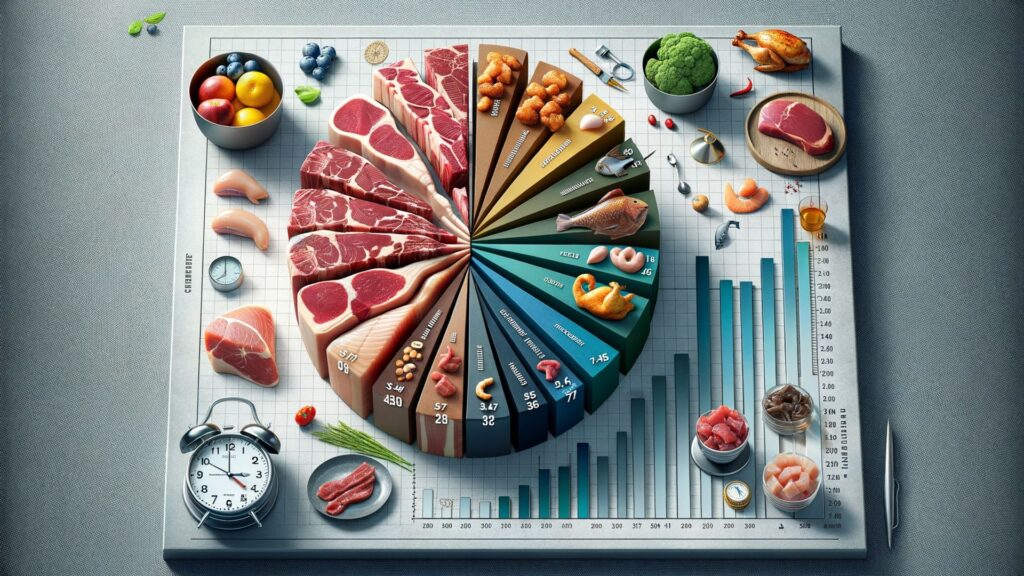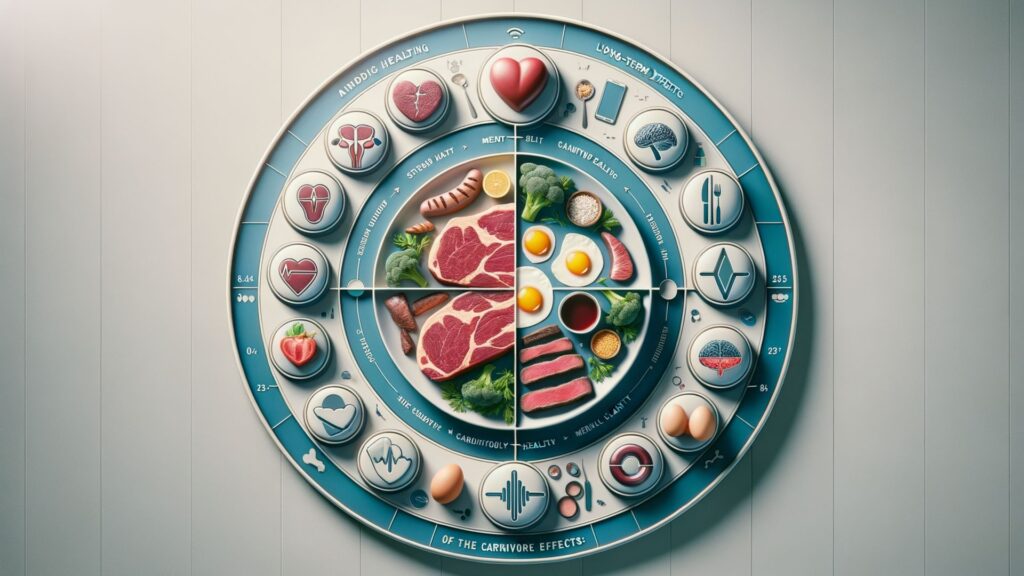Carnivore Diet: How Your Intake is Associated with Life
The carnivore diet has gained popularity as a radical departure from traditional dietary guidelines that typically emphasize a balance of food groups, including significant plant-based foods. Advocates argue that a diet strictly consisting of animal products can offer unique health benefits, improve human life expectancy, and enhance overall well-being. This article delves into the intricacies of the carnivore diet, contrasting it with a plant-based diet, exploring its effects on health, and examining its potential to address specific health conditions.

What is the Carnivore Diet and How Does It Differ from a Plant-Based Diet?
Understanding the Basics of the Carnivore Diet
The carnivore diet is a dietary regimen that emphasizes the exclusive consumption of animal products, primarily focusing on meat and animal-derived foods. This diet may include beef, pork, chicken, fish, eggs, and certain dairy products, while excluding all plant foods. Proponents assert that this high animal protein diet can lead to various health benefits, including weight loss, improved energy levels, and enhanced mental clarity. The carnivore diet posits that the human body is primarily designed to consume animal products, thereby challenging conventional wisdom regarding dietary diversity.
Comparing Carnivore Diet to Plant-Based Diet
In contrast, a plant-based diet emphasizes the consumption of fruits, vegetables, legumes, grains, nuts, and seeds, focusing on the health benefits associated with high fiber, vitamins, and antioxidants found in these foods. While both diets aim to improve health, they do so through fundamentally different approaches. The carnivore diet is characterized by the exclusion of carbohydrates, which contrasts sharply with the numerous carbohydrates provided by plant foods in a plant-based diet. The emphasis on red meat and processed meat within the carnivore diet raises questions about its long-term health effects, particularly in relation to heart health and life expectancy at birth.
Why Choose a High Animal Protein Diet?
Many individuals are drawn to the carnivore diet for its promise of increased satiety and reduced cravings, which can lead to lower calorie intake and potential weight loss. The higher levels of saturated fat found in animal products can also support energy needs, appealing to those who follow similar ketogenic principles. Additionally, some proponents argue that nutrient absorption is optimized through a high animal protein diet, as essential nutrients like vitamin B12, iron, and omega-3 fatty acids are abundantly present in animal products. As such, the intake is associated with life improvements in physical and mental capacities, leading some to consider it a sustainable long-term lifestyle change.
How Does Total Meat Intake Impact Human Life Expectancy?
The Role of Red Meat in Human Health
Red meat, often a cornerstone of the carnivore diet, has been subjected to scrutiny regarding its impact on human health. Research has indicated that moderate consumption of red meat, particularly when unprocessed, may not have adverse health effects and can be part of a balanced diet. However, the World Health Organization has classified processed meats as a probable carcinogen, leading to concerns about the health implications of excessive meat consumption. Understanding the role of red meat in the human diet is crucial for evaluating its effects on life expectancy, including life expectancies and child mortality rates associated with dietary patterns.

Is Meat Healthy or Bad for Your Health?
The debate surrounding the health effects of meat consumption is complex and multifaceted. While some studies suggest that high meat intake may correlate with increased risks of chronic diseases, others indicate that a protein diet rich in animal sources can promote muscle mass retention and overall metabolic health. The correlation between meat consumption and various health outcomes necessitates further investigation to determine the nuanced relationship between diet and health. It is essential to consider factors such as individual health status, lifestyle, and genetic predispositions when evaluating the health implications of a carnivore diet.
Health Claims Associated with High Animal Protein Diet
Advocates of a high animal protein diet often cite claims about its benefits for weight management, muscle preservation, and even mental health improvement. These claims are supported by anecdotal evidence and some studies that demonstrate positive outcomes in people who have adopted a carnivore lifestyle. However, it is crucial to approach these claims with caution, as scientific consensus on the long-term benefits and potential pitfalls of a carnivore diet remains inconclusive. As such, individuals considering this dietary approach should be aware of the health claims and assess their applicability to their unique health situations.
What Should a Carnivore Diet Meal Plan Look Like?
Sample Carnivore Diet Meal Ideas
A typical meal plan for someone following the carnivore diet may include breakfast options such as scrambled eggs cooked in butter, lunch featuring a grilled steak, and dinner comprising roasted chicken thighs. Snacks may consist of beef jerky or pork rinds. This high animal protein diet emphasizes simplicity and encourages the consumption of whole, unprocessed foods. It is important for individuals to experiment with different cuts of meat and cooking methods to discover flavors and textures that are enjoyable to them while adhering to the diet’s principles.
Essential Foods to Include in Your Carnivore Diet
In following a carnivore diet, it is essential to include a variety of animal products to ensure a well-rounded nutrient intake. Key foods should encompass various meats, including beef, lamb, pork, and poultry, as well as organ meats, which are nutrient-dense and rich in essential vitamins and minerals. Eggs and high-fat dairy products, such as cheese and butter, can also provide important nutrients and enhance the flavor of meals. The total meat intake is associated with health benefits when a diverse range of animal products is consumed.
Tips for Transitioning to a Carnivore Diet
Transitioning to a carnivore diet can be a significant change for many, particularly for those accustomed to a vegetarian diet or a diet rich in carbohydrates. Gradually reducing carbohydrate intake while increasing meat consumption may help ease the transition. Planning meals ahead of time and stocking up on essential foods can alleviate the challenges associated with meal preparation. Staying hydrated and ensuring adequate electrolytes are also vital during the initial adjustment phase, as the body may experience changes in metabolism and energy levels.
Can a Carnivore Diet Help with Conditions Like Type 2 Diabetes?
Understanding the Relationship Between Carbohydrates and Diabetes
Type 2 diabetes is a metabolic disorder characterized by insulin resistance, often exacerbated by high carbohydrate intake. The carnivore diet, by eliminating carbohydrates, may offer a unique approach to managing blood sugar levels. Some individuals with type 2 diabetes have reported improved glycemic control and reduced reliance on medications after adopting a high animal protein diet. However, the correlation between meat consumption and diabetes management requires further research to establish a concrete understanding of its benefits and risks.
How a High Protein Diet Affects Insulin Sensitivity
Research indicates that a high protein diet can enhance insulin sensitivity, which is crucial for individuals managing type 2 diabetes. By replacing carbohydrate sources with protein-rich foods, the body may experience improved metabolic function and more stable blood sugar levels. However, it is essential to monitor individual responses closely, as dietary needs can vary significantly among diabetic patients. Consulting healthcare professionals before making significant dietary changes is advisable to ensure safety and efficacy.
Potential Risks of a Carnivore Diet for Diabetic Patients
While there are potential benefits associated with a carnivore diet for type 2 diabetes, there are also inherent risks that should not be overlooked. High meat consumption may lead to elevated saturated fat intake, which can negatively impact heart health. Diabetic patients should be cautious of the balance between macronutrients and consider the implications of a diet high in red meat and processed meat. Regular monitoring of health markers, such as cholesterol levels and blood pressure, is advisable for those following a carnivore diet, particularly if they have underlying health conditions.
What Are the Long-Term Effects of Following a Carnivore Diet?
Evaluating Heart Health on a Carnivore Diet
The long-term effects of a carnivore diet on heart health are a subject of ongoing debate. While some may experience weight loss and improved metabolic markers, concerns remain about the potential for increased cholesterol levels and heart disease risk associated with high saturated fat intake. It is essential to evaluate individual responses to the diet and consider alternative sources of fat, such as fatty fish or avocados, to promote cardiovascular health. Understanding the implications of a high animal protein diet on heart health is vital for individuals aiming for longevity.

Possible Nutritional Deficiencies to Watch Out For
Although the carnivore diet can provide a plethora of nutrients, there are potential nutritional deficiencies that individuals should monitor. Essential vitamins and minerals typically found in plant foods, such as vitamin C, fiber, and certain phytonutrients, may be lacking in a strict carnivore diet. Individuals should consider incorporating organ meats and other nutrient-dense animal products to mitigate these deficiencies. Regular health check-ups and blood tests can help identify any imbalances and ensure that the diet remains nutritionally adequate.
Expert Opinions on the Sustainability of the Carnivore Diet
Expert opinions on the sustainability of the carnivore diet vary widely. Some nutritionists and healthcare professionals express concern about the long-term viability of a diet that excludes plant foods entirely, citing potential health risks and nutritional inadequacies. Others support the diet as a viable option for specific populations, particularly those struggling with metabolic conditions. Ultimately, the sustainability of the carnivore diet will depend on individual health goals, preferences, and the ability to adapt dietary choices over time.
Can The Carnivore Diet Help You Live Longer Frequently Asked Questions:
Q: What is the relationship between meat intake and life expectancies?
A: Research indicates that there is a complex relationship between meat intake and life expectancies, with some studies suggesting that moderate consumption of meat can be associated with a greater life expectancy, while excessive intake may lead to negative health outcomes.
Q: How does the carnivore diet affect people’s health?
A: The carnivore diet, which emphasizes the consumption of animal products while excluding plant-based foods, can lead to various health outcomes. Some proponents argue that it can improve health markers, while others warn of potential deficiencies and the impact on overall health.
Q: Can eating meat contribute to a longer life span?
A: While some studies suggest that moderate meat consumption can be a significant predictor of life expectancy, others emphasize the importance of balance and variety in the diet to support long life and human health and life.
Q: What are the benefits of eating meat in a high-protein diet?
A: Benefits of eating meat in a high-protein diet include improved muscle mass, enhanced satiety, and better metabolic health. However, it is essential to consider total meat consumption and ensure it aligns with an individual’s health goals.
Q: Is the keto diet related to the carnivore diet?
A: The keto diet, which is a low-carbohydrate, high-fat diet, can overlap with the carnivore diet since both emphasize high protein and fat intake. However, the carnivore diet exclusively includes animal products, while the keto diet allows for a broader range of foods.
Q: How does total meat consumption impact health and longevity?
A: Total meat consumption can impact health and longevity in various ways. Moderate consumption may provide essential nutrients and support longevity, while excessive consumption may be linked to increased mortality risk.
Q: What foods should be included in a balanced carnivore diet?
A: A balanced carnivore diet typically includes a variety of meats, such as beef, pork, poultry, and fish, along with animal-based products like eggs and dairy. It is vital to ensure a nutritional balance to mitigate potential health risks.
Q: What does research say about the cross-sectional association between meat intake and mortality?
A: Research shows that there is a cross-sectional association between meat intake and mortality, highlighting that individuals with high meat consumption may experience different health outcomes compared to those with lower meat intake, depending on the type and quality of meat consumed.
Q: Are there any risks associated with high meat eating in one’s diet?
A: Yes, high meat eating can pose risks such as increased exposure to saturated fats and potential links to chronic diseases. It is crucial to consider the quality of meat and to balance meat intake with other food groups for optimal health.




